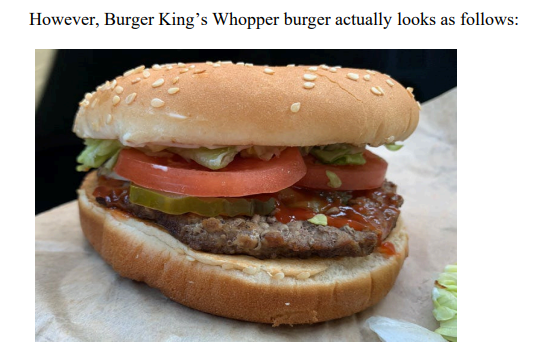Is Burger King telling whoppers about its burgers? Arizona woman part of class-action lawsuit
Home of the Whopper? Hardly, if a new lawsuit involving an Arizona woman is to be believed. She and others say the meat patties are nowhere near the size they expected.
She is one of a group of plaintiffs that paved the way for a judge to decide that Burger King must face a class-action lawsuit after claims the fast-food giant engaged in false advertisement.
Attorney Anthony Russo filed the original lawsuit last year in Florida, where Burger King is headquartered. The Arizona plaintiff is among 20 plaintiffs across 11 other states involved in the suit.

They accused the chain of falsely representing that its burgers as approximately 35% larger than they are and containing more than double the meat they actually contain.
Other accusations in the suit included violation of state consumer protection laws, breach of sales contracts, negligent misrepresentation, and unjust enrichment.
The group is seeking monetary damages that fully compensates all those deceived after purchasing an overstated menu item from the chain. They also request injunctive relief requiring Burger King to correct its advertising or stop selling the food that was promoted in allegedly deceptive ads.
According to the filing, Burger King began to overstate the size of its burgers in its advertisements in September 2017.
Sometime later, Arizona resident Summer Adamski was duped when she bought a Whopper from the chain, according to last year's court filing.
She expected that the burger was going to be similar in size to the picture of the establishment's advertisements and their menu ordering board, according to the document.
In the advertisement photo, the Whopper looked taller, with the tomato and onion slices appearing to stick out more than in previous advertisements. But the stunner was the patty — it looked thicker and wider as it stuck out of the burger.
But that was not the case. The size of the burger that Adamski received was much smaller than was advertised. As a result, Adamski was financially damaged, the complaint claimed.
In the plaintiff's court filing last year, the Whopper advertisement showed it to be $6.39, but prices may vary. The chain's dismissal filing just a couple weeks later showed it as $5.89.
It is argued in the filing that if Adamski knew that the burger was going to be much smaller than advertised, she would not have purchased it.

Adamski's story is similar to that of the other plaintiffs.
Burger King wasn't just falsely inflating their burgers. The chain overstated the size of nearly all of their menu items as of May 2022, according to court documents. These included their sandwiches like the Whopper Melt and the Fully Loaded Croisann'Which.
The chain denied the plaintiff's claims and asked for the case to be dismissed, stating in court documents that reasonable consumers knew that food in advertisements have always been styled to make it look as appetizing as possible.
They also argued, using their online description of the Whopper, that they have made it clear that the burger is a "1/4 lb* of savory flame-grilled beef topped with juicy tomatoes, fresh lettuce, creamy mayonnaise, ketchup, crunchy pickles, and clicked white onions on a soft sesame seed bun."
"*Weight based on a pre-cooked patty," is listed at the end of the description, a fact the chain included in their filing.
The chain also argued it is not required to serve burgers that look exactly like the pictures.
Last week, U.S. District Judge Roy Altman of Florida's Southern District Court dismissed the argument that Burger King misled their consumers through their television and online advertisements, according to a court filing. Altman also dismissed the argument that the chain violated consumer protection laws.
However, Altman ruled that the other accusations of negligent misrepresentation, breach of contract, and unjust enrichment were valid.
Altman stated in the court filing that the court was not in the position to find out whether the difference in "what was promised" and "what was sold" was enough to alter how a reasonable consumer would spend their money.
He stated that decision would be better left to consumers "who — if the cases survives that far — will likely get to sit in the jury box and tell us what reasonable people think on the subject."
This article originally appeared on Arizona Republic: Arizona woman part of Burger King lawsuit over size of Whoppers

